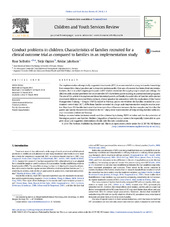Conduct problems in children. Characteristics of families recruited for a clinical outcome trial as compared to families in an implementation study
Peer reviewed, Journal article
Published version

View/
Date
2014-07Metadata
Show full item recordCollections
Original version
https://doi.org/10.1016/j.childyouth.2014.03.019Abstract
The implementation of empirically supported treatments (EST) is recommended as a way to transfer knowledge fromresearch to clinical practice and to improve service quality. One area of concern has been client representativeness, that is to which degree participants in EST studies resembles the target group in usual care settings. For childrenwith conduct problems the recommended ESTs have been parent training or parentmediated programs. The aimof this article is to explore and describe central parent and family characteristics of families with conduct disordered children recruited from ordinary clinical practice in connection with the evaluation of the Parent Management Training — Oregon (PMTO) model in Norway, and to see whether the families recruited to a randomized control trial (RCT) differ from families recruited to a large scale implementation study in routine practice. Data from376 families indicated that there were fewdifferences between the two samples and thus that the parent and family characteristics found in the RCT study were representative of help-seeking families with conduct disordered children in Norway. Perhaps an even better treatment result could be achieved by tailoring PMTO to better suit the characteristics of Norwegian parents and families.Mothers (regardless of marital status) seem to be especially vulnerable to caregiver strain and suggested interventions should take this into consideration.
